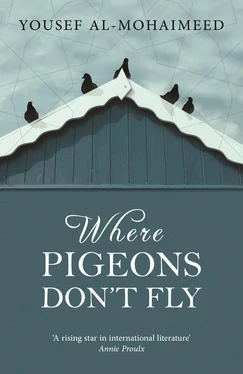She wanted to marry Sami, but something told her that her father would have refused the match because she was yet to finish her studies and also because he evaluated men quite differently than her brothers, unmoved by material concerns and never flattering anyone. He hoped to see every one of his girls at university and in the best departments. He had no patience with absenteeism from school and would turn into a tyrant whenever his wife asked him to let Ahlam or Ilham take a day off. But after his death, anyone who wanted to go to school could go and if they couldn’t be bothered than no one would blame them. The house was transformed into a little city of chaos within a city beset by chaos.
One night, Tarfah read the little advertising slogan blinking on the ATM screen, which described the country as the Kingdom of Human Kindness. Putting the notes in her wallet she thought to herself, ‘Incredible! They’re calling it the Kingdom of Human Kindness! Wouldn’t the Kingdom of Chaos be better?’
‘Find out about him? He’s our child! We’ve known him since he was little!’
This was her brothers and sisters, speaking about Sami. They were delighted whenever he came over, sitting beside him in a fever of excitement like someone having a photo taken with a minor television star. Only Ahmed, the second oldest of her brothers, remained unimpressed. Actors, singers and sports stars, he said, led dissolute lives and were unsuitable for marriages; that went for Sami, too, regardless of the fact they knew him.
Ahmed wasn’t extreme in his beliefs but he observed the daily prayers at the mosque, the first and only person to perform the dawn prayer in their neighbourhood mosque for many years. He disliked gossip, hated nobody and was affectionate and devoted towards his family, his sisters and his widowed mother.
Before her father passed away, Tarfah’s cousin, son of the uncle who lived in Khobar to whom, or to whose family, she was partial because she felt that they were more civilised, asked for her hand in marriage. Her father refused on principle to countenance an unemployed man, even though his family were only suggesting an engagement, and gave them to understand that her future would never be linked to a man who couldn’t tell how long he might be waiting for a job.
As for Sami, Tarfah knew no more about him than the average television viewer or what could be gleaned from his photographs in the press, but she was quite certain that she disliked his inquisitive, vulgar family whose general manner and way of speaking lacked sophistication and breeding. When his mother and older sister came to present her with the offer her reaction had not been good, but his maternal aunt, who happened to be Tarfah’s cousin, spoke with her and managed to convince her, telling her that he had confided his love for Tarfah to his sister, recalling the lovely eyes she had had as a child before she had covered up.
If he couldn’t marry her, he declared, then he would never marry.
She didn’t have a clear childhood memory of him. She had seen him in the flesh just once, a few months back when he had visited her uncle’s house. With her cousin Samia, Tarfah had spied on him through the opening in the tent. She had thought that he was just a vain young man, inordinately proud of the pair of curls that flopped across his brow. He was talking to his aunts and moving his hands about confidently, maybe arrogantly.
Their phone conversations after the engagement never went further than his television appearances, his minor stage roles and his friends in the industry. They never touched on any relationships with other women. He was just an actor playing supporting roles, who got his break on Channel One, in instructional slots that advised the viewer not to waste water, to exercise financial prudence, and to show respect to the disabled and assimilate them into society, and so on.
Tarfah didn’t take the business of marriage terribly seriously. She sat watching a foreign film with subtitles at noon on her wedding day while Asma shouted, ‘From now on you’ll get him in the flesh!’ from outside the room, assuming that she was gazing at Sami on screen. This lack of excitement on her wedding day left her family in shock. Her appearance didn’t change until after the evening prayers in the wedding hall. She wore a blouse and skirt and her hair was carelessly tousled; in the end Abdullah shouted at her, bewildered at her indifference and lack of emotion.
No one understood that Sami needed her to be able to show her off at events, while people whispered, ‘That’s Sami’s wife!’
‘He cared about my dresses and how I looked, not for my sake or his, but for those women whose comments he always looked forward to.’
She was led to him by her gossiping sisters who spent the time comparing Tarfah to her cousin or her aunt, and despite her happiness to see her family gathered together in one place, especially the women, her mother-in-law began to isolate her bit by bit from the rest, claiming to be worried about the jealous eyes of the other women.
Sami travelled a lot for work, moving with various camera crews around Egypt, Syria and Jordan where the studios were, but he missed her and at night he would woo her endlessly down the phone. He bought her gifts and beautiful antiques on which he inscribed poetic sentiments and the words of favourite songs expressing how he felt inside. Indeed, when he came home he would bring scraps of paper on which he’d recorded his longing: receipts and bills, a ticket stub from a bus or train, film and theatre tickets. Every scrap of paper he kept in his jeans was a blank page for the words and thoughts he addressed to his beloved Tarfah.
The strange phone calls didn’t bother her at first either when Sami answered and told the caller it was a wrong number or the times she answered and the caller hung up. It didn’t make her angry, but doubt took root in her heart, especially when he would lower his voice during phone calls he didn’t want her to hear. She ignored it, though, because she trusted him.
All this she let pass without a fuss, but not so his peculiar attempts to isolate her from other people, to keep her as far as possible from his relatives and in particular, his aunt and her cousin Samia in whom she had discovered two new friends. He didn’t like her calling them when he was away, as though he wanted to hear every word she said to them and they to him. It got to the point that on entering the flat he would immediately ask her who had called and what they had talked about, even sneaking a look at the list of received calls on her phone and rampaging about the house, enraged and consumed by suspicion, if he found that the list had been deleted.
Yet at the same time, returning to their flat after taking Tarfah to see her family in Suweidi, he would spend hours on the phone with his aunt. He was uneasy about his aunt’s manner and he was worried about her influence over his wife. She had something on him. His surveillance of Tarfah reached a point where instead of checking her incoming and outgoing calls he felt the need to place a small listening device beneath a couch in the men’s majlis that sat alongside the table where the phone lay. So suspicious was he in fact, that before they went out together on some errand or other he would wait for Tarfah to go to the bathroom, then rummage through her handbag.
Sami was paranoid, but life went on, slow and unchanging, until the day he returned unexpectedly early from Amman, before the end of a shoot for a new soap opera. The production manager had fired him for molesting a young Palestinian make-up artist. As she bent over him to apply cream and make-up at the start of each day he would start praising her eyes and mouth. Then he went further, sliding his hand along the armrest, to make the movement look accidental, and letting his elbow brush her thigh. She finally screamed at him one day and everyone gathered round, the actors, the director, the assistant director, the set designer and the wardrobe master, to find the girl in tears, casting her powder brush aside and refusing to work.
Читать дальше












